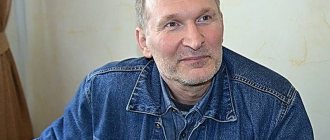Childhood
Maxim's father Isaac Dunaevsky was a famous classical composer. Mother Zoya Pashkova was a ballerina in the Moscow theater. The parents were not officially married, because the father was officially married to Zinaida Sudeikina. In this union he had a son, Evgeniy, who was Maxim’s half-brother.
Isaac Dunaevsky passed away very early, when Maxim was still in middle school. Next came the question of inheritance. With the assistance of influential figures in music, Maxim and his mother were recognized as the legal heirs. Until 1961, Maxim Dunaevsky wrote works under his mother’s maiden name, and after his father’s death he took his surname.
Maxim became interested in music in early childhood. He often sat down at the piano, came up with melodies, and improvised. But he was not very persevering, so his parents did not insist on studying. After the sudden death of Dunaevsky Sr., Maxim seriously took up music and set himself the goal of becoming a famous composer, like his father.
Student years
Maxim entered the music school, graduated with high marks and continued his studies at the P.I. Conservatory. Tchaikovsky. The future talented composer studied classical music. But his acquaintance with the student theater “Our House” turned the composer’s whole life upside down. He began writing compositions for films and plays.
As a student, Maxim created classical works. His creative collection includes piano concertos, numerous romances and cantatas. A little later, the composer became interested in creating stories for the stage and cinema.
Musical pieces from “The Twelve Chairs” and “The Search for Captain Grant” are by Maxim Isaakovich. More than 60 films were released on TV screens, in which the maestro’s wonderful music sounded. The composer did not ignore television plays and cartoons; Dunaevsky wrote many compositions for them.
After immigration
In 1992, Maxim moved to America and lived there until 1999. Abroad, the composer continued his work, published articles and appeared on television. For Hollywood, the master wrote music for several films.
At the end of the century Dunaevsky returned to Russia
Maxim Isaakovich's songs were popular among pop performers such as Tatyana Bulanova, Mikhail Boyarsky and Masha Rasputina. The maestro wrote more than 10 songs for Nikolai Karachentsov, which were included in the album “My Little Lady”.
The songwriter does not always speak flatteringly about modern performers. In his opinion, many of them should not have gone on stage. The only young musicians he praises for their professionalism are Dima Bilan and Alexander Panayotov.
Filmography
- 1986 - Courier - Ivan Miroshnikov
- 1987 - Before the big road to war
- 1988 - Dear Elena Sergeevna - Vitek Shevchenko
- 1988 - Three Brave Ones
- 1991 - Promised Heaven - Andrei, Zhanna’s classmate
- 1991 - The Wizard Violinist
- 1992 - Youth of Tel Aviv
- 1993 - Maestro with a thread
- 2012 - Rook (TV series), 10th episode - Evgeny Karasev, grandson of the widow of General Karasev
(Russia) - 2012 - Surveillance/Stompers (TV series), episodes 5 and 6, “Fabricated Janus” - prefectural official
Movie soundtracks and hits
Dunaevsky gained wide popularity by creating music for his favorite films:
- “Fortune Teller” from the film “Ah, Vaudeville, Vaudeville”
- "Call me, call" film "Carnival"
- "Winds of Change" from "Goodbye Mary Poppins."
The hits from the film “D'Artagnan and the Three Musketeers” were especially popular. The famous hit “It’s time, it’s time, let’s rejoice...” became a mandatory rhythmic test for music students, although the previously popular style was unacceptable for music schools.
Dunaevsky has more than 150 hits, released on records and in the “Golden Collection” collections.
At the beginning of the 21st century, the film “Border. Taiga novel." Maxim Isaakovich composed the music for the melodrama. Other films were not without works by the famous composer: “The Twelve Chairs”, “Utesov”, “The Flying Ship”. Currently, Dunaevsky is involved in the creation of new projects. This is the film “1812: The Uhlan Ballad”, in which the main roles were played by Sergei Bezrukov and Anna Chipovskaya.
Star Trek by composer Maxim Dunaevsky: first songs and great success
In 1972, Maxim Dunaevsky first tried to write music for a cinematic film.
In this regard, the debut film for the composer was the film “Blue Hares, or a Musical Journey,” in which several of the author’s songs were performed at once. Maxim Dunaevsky waltz from “Mary Poppins, Goodbye” The first “damn” turned out to be quite successful, and therefore later our today’s hero began to often write music for various Soviet films. Among his best works are compositions written for such famous films as “D’Artagnan and the Three Musketeers”, “Ah, Vaudeville, Vaudeville...”, “Mary Poppins, Goodbye!”, “The Musketeers Twenty Years Later”, “A Small Favor” ", "Carnival", etc. These works made Maxim Dunaevsky one of the most famous composers in the Soviet Union. In total, his songs were performed in more than thirty Soviet films. Therefore, his work has always developed in parallel with the development of cinematographic art in the USSR. In 1977, our today’s hero organized the “Festival” pop ensemble, with which he subsequently collaborated closely. In addition, compositions written by Dunaevsky also appeared in the repertoire of such stars of the Soviet stage as Mikhail Boyarsky, Nikolai Karachentsov, Lyubov Uspenskaya, Tatyana Bulanova, as well as many other famous artists.
In parallel with other types of creativity, Maxim Dunaevsky also worked on writing music for theatrical works. Over the years, he took part in the creation of such performances as “The Boy with a Sword”, “The Three Musketeers”, as well as the musicals “Tili-tili-dough...”, “In Search of Captain Grant”, “The Twelve Chairs” and many others.
Maxim Dunaevsky. My hero After the collapse of the Soviet Union, the composer moved to America, where he also successfully worked for some time as a composer of film music. Between 1992 and 1999, eight films were released in the United States, the music for which was written by Maxim Dunaevsky.
After returning to Russia, our today's hero continued to work with Russian directors. During this period, the famous author wrote music for the TV series “Border. Taiga novel", "Utesov. A song that lasts a lifetime”, “Amapola”, as well as for the films “Atlantis”, “Formula of Happiness”, “Park of the Soviet Period”, as well as many others.
Confession
Dunaevsky participated in a television program dedicated to the operetta “With a Light Genre!” He was also on the judging team of the program “People’s Artist”, and was one of the experts for the qualifying round at Eurovision. The composer took part in the creation of the annual television program “New Songs about the Main Thing.”
A separate milestone in the composer’s work was writing works for musicals. All his life Dunaevsky wanted to create the musical Scarlet Sails. And he succeeded. The performance was first shown on the stage of the RAMT Theater, the second edition was a success at the Yekaterinburg Comedy Theater. In Perm and Novosibirsk, the actors of the play received the Golden Mask awards.
A bright page in the composer’s biography was a program on one of the federal channels dedicated to the work of Dunaevsky
Personal life
The personal life of Maxim Dunaevsky is truly surprising: the composer led each of his 7 passions down the aisle. It is known that the composer had 7 wives. And these are only official relations.
Natalia Leonova
Maxim got married for the first time while he was a student. The chosen one was Natalya Leonova, the daughter of the Secretary of the CPSU Central Committee, a wonderful actress who played in many films. Two years later the marriage broke up. The maestro himself admits that without love there can be no marriage and, if feelings have cooled down, you need to leave.
Natalya’s influential father threatened Maxim with all sorts of curses, but the most he did was get a temporary ban on traveling abroad. Unions with singer Regina Temirbulatova and Elena Dunaevskaya were also short. The composer left all his acquired property and apartments to each of his ex-wifes.
Heir
The next wife of Maxim Isaakovich was Natalya Andreichenko. The main role in the film “Mary Poppins...” brought fame to this actress. Natalya gave birth to her husband's son Dmitry. But the relationship was short-lived, and the actress left Dunaevsky. She fell in love with foreign actor Maximilian Schell and went abroad with him. Son Dmitry now lives in Switzerland and does not maintain contact with his father.
Daughter Alina
In parallel with his official relationship with Andreichenko, the composer had an affair with Nina Spada, which lasted 2 years. The woman worked as a translator from foreign languages, and also wrote books, one of which was revelations about Maxim Dunaevsky.
Nina was the muse for writing the song “Call Me, Call” from the film “Carnival”
Maxim's beloved gave birth to his daughter Alina. But Dunaevsky did not want to commit himself to official relations. After some time, Nina married a Frenchman and moved to live abroad. Daughter Alina grew up in Paris and became a famous musician. She created her own group and performed songs in French and Russian. Participated in various musical events.
The gene of a talented father and grandfather was passed on to her. Alina remade the song from the film “Carnival”, breathing new life into it. The girl took part in the creation of a documentary film on the NTV channel, which talked about the daughters of the famous composer.
Two short marriages
Romances with model Olga Danilova and singer Olga Sheronova brought the composer to the registry office, but did not last long. The reason for this was past love.
Marina Rozhdestvenskaya
The composer's seventh wife was Marina Rozhdestvenskaya. She was much younger than her husband. Dunaevsky himself told how the girl resembled his mother in appearance and character. The woman gave birth to Maxim's daughter Polina. From a previous relationship she had another child - a daughter, Maria, whom Dunaevsky subsequently adopted and gave his last name.
The couple have been happily married for 20 years. The composer's relationship has never been so long. Maxim admits that he has become more patient in relationships. Marriage is work that is not given to everyone. A stable personal life also had a positive impact on creativity. Marina became the only wife with whom Dunaevsky married.
Broken connections
Dunaevsky broke off relations with many of his children. So, he does not communicate at all with his son from Natalia Andreichenko, Dmitry, and his daughter from Nina Spada, Alina. Maxim refuses to comment on his decision. The youngest daughter Polina plunged headlong into her acting career. The eldest Maria studies at the Shchepkinsky School.
Isaac Dunaevsky - “Chief of Soundtracks” in the Soviet Union
In 1949, Dunaevsky enjoyed great success after the release of Ivan Pyryev’s film “Kuban Cossacks”. The songs “What You Were...”, “Oh, Viburnum is Blooming”, “Be Healthy, Live Richly” based on the verses of Mikhail Isakovsky instantly received the status of folk songs (and are still an indispensable attribute of feasts), and the composer himself was awarded the Stalin medal for the second time awards - he received his first in 1941 for the films “Circus” and “Volga-Volga”.
Inspired by success, Isaac Dunaevsky and director Ivan Pyryev began a new joint work - “Test of Loyalty” (1953). But it was not possible to repeat the success of the Kuban Cossacks, according to the website of the Jewish Journal. Jewish God and Russian Tikhon
Twice laureate of the Stalin Prize, People's Artist of the RSFSR Isaac Dunaevsky received not only honorary titles, but also huge fees. However, even he suffered a lot during the persecution in the 40s and early 50s. The ring around him tightened especially tightly in 1951.
“During this chaos, I called Isaac from Poltava and asked him about his health,” said Dunaevsky’s older sister Zinaida Osipovna. “Zinochka,” he answered me, “I’ve lost the habit of praying. If you have not lost this ability, then pray to our Jewish God for the Russian Tikhon - I owe him honor and life.”
Dunaevsky was talking about the musician, chairman of the Union of Composers of the USSR Tikhon Khrennikov. He went to the Central Committee of the party and openly stood up for “the first composer who brought Soviet music closer to the people,” writes the Slovo magazine.
There are so many good girls...
According to First Crimean, Dunaevsky was officially married to ballerina Zinaida Sudeikina - they got married in 1925. In 1932, their son Evgeniy, a future famous artist, was born. But this did not stop Isaac Dunaevsky from falling in love again and again. So, he was very - and for a long time - passionate about the dancer Natalya Gayarina. In addition, the subject of his passion was the most popular actress Lydia Smirnova.
Their romance began after the filming of the film “My Love,” in which the actress played the main role, in 1941. The composer in love did not skimp on expressions of feelings: from Leningrad he sent letters and telegrams to the married Smirnova every day - and demanded the same number of messages in return. The correspondence exhausted the actress so much that sometimes she sent her friend the artist Shishkin to the post office so that he would come up with something and send it on her behalf.
Lydia Smirnova was flattered by Shani’s attention (Dunaevsky signed his letters with the nickname of Strauss from the popular film “The Great Waltz,” which was released simultaneously with “My Love”), but when the maestro proposed to her, she refused. Dunaevsky was offended and at the next meeting he harshly told her: “I don’t love you anymore!” The novel was finished.
The composer never forgave the actress for her refusal. On the eve of Dunaevsky's death, Smirnova met him in a Baltic cafe. When the orchestra unexpectedly started playing a song from “My Love,” Smirnova waved to the musicians in gratitude. “Do you think they recognized you? — instead of greeting, Dunaevsky said mockingly, sitting down at her table. And he added smugly: “I ordered it for them.”
Another great love of Isaac Dunaevsky was the dancer Zoya Pashkova, who in 1945 gave birth to his “unofficial” son Maxim, who later also became a famous composer, author of many hits, including from the films “The Three Musketeers”, “Carnival”, “Mary Poppins” ", the cartoon "Flying Ship", the songs "City Flowers", "Everything will pass", etc.
“Dad was married. Although he had not lived with that family for a long time, everyone knew that his wife was Zoya Pashkova. Mom was not his mistress in the usual sense of the word. Dad appeared with her everywhere openly. For fifteen years, from 1940 to 1955, they lived as husband and wife. I appeared in 1945. And throughout all this time I knew and felt that I had a dad. But nevertheless, he was not divorced,” said Maxim Dunaevsky.
In Maxim Isaakovich’s birth certificate, there was a dash in the “father” column for many years, because at that time married men were not recognized as the fathers of children born out of wedlock. To formalize paternity, the couple had to resort to the help of the Council of Ministers of the USSR, and a few years later, by a special decree, an illegitimate child was allowed to bear the surname of the legendary composer Isaac Dunaevsky.
The heart has found peace
Dunaevsky died on July 25, 1955. At 11 o’clock in the morning, a severe spasm squeezed the heart, “which did not want peace,” and it stopped forever. The famous Soviet composer was only 55 years old.
After the death of her husband, his wife Zinaida Sudeikina became seriously ill and was motionless until her death in 1979. “Common-law” wife Zoya Pashkova, mother of Maxim’s son, died in a car accident on January 30, 1991 - the birthday of Isaac Dunaevsky.
Maxim Dunaevsky now
To this day, Maxim Isaakovich continues to create. In 2020, he wrote music for the melodrama “About Love” by Vladimir Bortko. Starring famous Russian actors. In 2020, Dunaevsky took part in the “Honest Word” program, hosted by Yuri Nikolaev. At the meeting, he spoke about his father, children and spouses. And he was also frank about the state of modern show business.
The last wife of composer Maxim Dunaevsky, with whom he is still married to this day
The famous composer has his own website, as well as an Instagram profile, where he periodically posts new information and photos from concerts and tours. In addition to creativity, Dunaevsky is involved in charity work. There is a foundation of which he is the president.
Notes[ | ]
- ↑ 1 2 3 4 Chumakov V.
The courier has returned // Gala Biography. - 2006. - No. 04. - P. 108-120. - Natalya Dyachkova.
Fyodor Dunaevsky: I starred in “Courier” for the money (Russian). Interlocutor (December 4, 2018). Retrieved April 7, 2020. - The star of the film “Courier” spoke about his work as a janitor and a certificate from a psychiatrist (Russian). Channel Five (February 14, 2019). Retrieved April 7, 2020.
- Andrey Petrov.
Why doesn’t Fyodor Dunaevsky act in films anymore? (Russian). Komsomolskaya Pravda (September 11, 2013). Retrieved November 21, 2018. - Sergei Prudnikov.
Fyodor DUNAEVSKY: “I spoke in my own words” (Russian) (inaccessible link). Evening St. Petersburg (June 24, 2016). Retrieved November 21, 2020. Archived November 22, 2020. - Maria Molchanova.
“Courier” by Karen Shakhnazarov (Russian). Echo of Moscow (April 15, 2017). Retrieved April 7, 2020. - Ivan Usachev.
Secrets of our cinema. "Courier" (Russian). TV Center (January 24, 2017). Retrieved April 7, 2020. - Dmitry Borisov, Alexander Plyushchev.
Travel companions. Fyodor Dunaevsky (Russian). Echo of Moscow (August 4, 2013). Retrieved November 21, 2020. - Sergei Prudnikov.
Fyodor Dunaevsky about “Courier” 30 years later, the death of Bazin and Israel (Russian). Poster Daily (July 4, 2016). Retrieved November 21, 2018. - Yulia Milovich-Sheralieva.
Fyodor Dunaevsky. Rehabilitation of the image (Russian). Superstyle (November 27, 2017). Retrieved April 7, 2020. - "SerGa" made a film about a bank robbery (Russian). Intermedia (February 2, 2017). Retrieved April 7, 2020.
- Alina Shuvalova.
“Without ceremony”: Fyodor Dunaevsky (Russian). M24.RU (June 4, 2016). Retrieved April 7, 2020.











